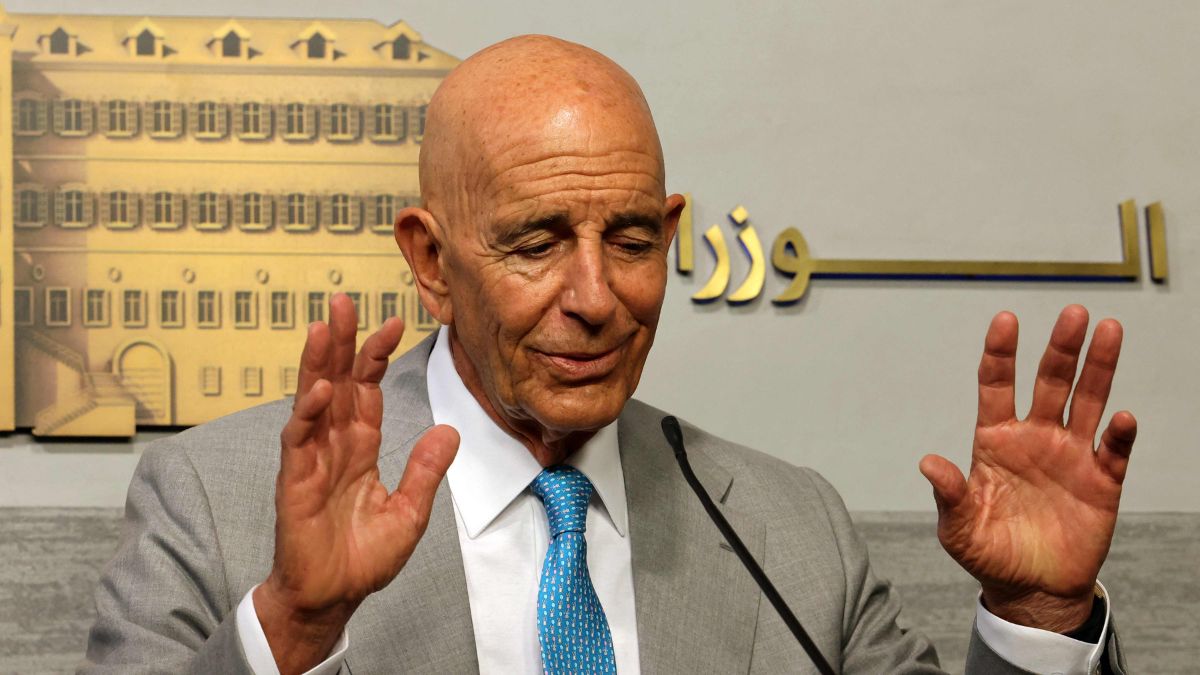US criticises Israeli airstrikes on Syria, backs the Ahmad al-Sharra regime in Damascus
 US special envoy for Syria Tom Barrack gives a press conference after his meeting with Lebanon's Prime Minister at the government palace in Beirut on July 21, 2025 | AFP
US special envoy for Syria Tom Barrack gives a press conference after his meeting with Lebanon's Prime Minister at the government palace in Beirut on July 21, 2025 | AFP
The United States has reaffirmed its support for Syria’s new government, despite spiralling sectarian violence in the south and Israeli military intervention that has complicated efforts to stabilise the war-ravaged country. US Ambassador to Turkey and Special Envoy to Syria Tom Barrack said yesterday there was “no Plan B” to working with the newly installed regime in Damascus, which came to power after the ousting of longtime president Bashar al-Assad in December. Barrack praised the government’s efforts to unify a country fractured by 14 years of war, while also criticising Israel for what he called “poorly timed” airstrikes that risk deepening instability.
The comments came after more than a week of deadly clashes in the southern province of Sweida between Druze militias and Sunni Muslim Bedouin tribes. The fighting has claimed over 1,260 lives, according to the Syrian Observatory for Human Rights. Syrian government forces, initially deployed to restore order, ended up siding with the Bedouins before withdrawing under a ceasefire agreement negotiated with Druze factions.
In a dramatic escalation, Israel launched multiple strikes last week on Syrian army convoys in Sweida and targeted the Ministry of Defence in Damascus. The Israeli government said the strikes were aimed at halting the killing of Druze civilians, who share ethnic and religious ties with Israel’s Druze minority.
Barrack, speaking after announcing a limited US-brokered ceasefire between Israel and Syria, criticised the Israeli action, saying, “The United States was not asked, nor did they participate in that decision.” He added that Israel’s intervention “creates another very confusing chapter” and “came at a very bad time.”
The ceasefire, in place since July 19, focuses solely on the conflict in Sweida and does not address wider Israeli concerns, including its demand that southern Syria be designated a demilitarised zone. Yesterday, Syrian authorities began evacuating Bedouin families from the area in an attempt to prevent further violence.
President Donald Trump was “caught off guard” by Israel’s strikes in both Syria and Gaza last week. “In both accounts, the president quickly called the prime minister to rectify those situations,” said White House spokesperson Karoline Leavitt.
An Israeli missile strike hit Gaza’s only Catholic church last week, killing three people and injuring 10 others, including the parish priest. The priest had received daily calls from the late Pope Francis. Prime Minister Benjamin Netanyahu called Pope Leo to express regret over the incident, attributing it to a “stray missile.”
Trump has been pushing for the normalisation of ties between Israel and Syria, a process that appeared to be gaining ground before the latest violence erupted. Israeli officials were in contact with Syrian counterparts south of Damascus to discuss security arrangements, but the new government in Damascus took a different stance. “Israel’s view was that south of Damascus was this questionable zone… but the new government coming in was not exactly of that belief,” Barrack said.
The White House, meanwhile, is trying to balance support for Syrian minorities with a broader regional strategy. Interim Syrian President Ahmad al-Sharaa, a former insurgent commander once aligned with Al Qaeda, came to power following a US-backed offensive that removed Assad from office. In May, Trump met with Sharaa in Saudi Arabia and lifted longstanding US sanctions on Damascus. A US bounty on Sharaa was also quietly dropped.
Despite pledges to protect minority groups, Sharaa’s government has faced criticism for failing to prevent attacks on Druze and Alawite civilians. Earlier this year, hundreds of Alawites—Assad’s sect—were killed in retaliatory violence on the Syrian coast. Barrack acknowledged the suffering on all sides, saying “the killing, the revenge, the massacres… are intolerable.”
Efforts are also underway to integrate Kurdish-led forces into the national army. Talks with the US-backed Syrian Democratic Forces, who control much of northeast Syria, are ongoing. Barrack said a breakthrough could happen “in the coming weeks” despite the turmoil in Sweida.
Turkey has offered military assistance to Syria, raising concerns over Ankara’s intentions given its longstanding hostility toward Kurdish militias. Barrack declined to comment on a potential Syrian-Turkish defence pact, saying, “It’s not in the US’s business or interest to tell any of the surrounding nations what to do.”
Barrack also visited Lebanon, where the US is urging Hezbollah to disarm following a bruising war with Israel that ended in a ceasefire last November. However, the truce has failed to hold, with Israel continuing to strike Hezbollah targets in southern Lebanon. “The ceasefire agreement didn’t work,” Barrack admitted. He added that while the US supports Hezbollah’s disarmament, the matter is an “internal” Lebanese issue. “There’s no threat, there’s no whip, we’re here on a voluntary basis trying to usher in a solution,” he said.
Trump’s recent White House meeting with Netanyahu—their third since January—was expected to yield progress on a Gaza ceasefire and the release of hostages held by Hamas. But the visit ended without a breakthrough. Talks are ongoing, with Hamas stating yesterday that it is “exerting all efforts” to reach an agreement.
Leavitt defended the administration’s response to the Gaza crisis, attributing the slow delivery of aid to the policies of the previous administration. “It’s a very difficult and complicated situation that the president inherited. The president wants to see peace, and he’s been pretty clear on that.”
Amid the diplomatic fog, Barrack reiterated his belief in Syria’s unity. “Strong nation-states are a threat—especially Arab states are viewed as a threat to Israel. But in Syria, I think all the minority communities are smart enough to say, ‘We’re better off together, centralised.’”
Middle East